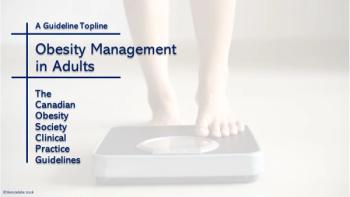
Insurance companies believe the required presurgical programs reduce complications and improve outcomes but a new study strongly suggests the opposite.

Impact of Social Determinants of Health on Key Cardiometabolic Measures Amplified by New Research

Insurance companies believe the required presurgical programs reduce complications and improve outcomes but a new study strongly suggests the opposite.

ENDO 2022: Findings from the long-term, real-world study of meds for maintenance of meaningful weight loss support wider uptake of the agents, authors say.

ADA 2022: Professor Hiddo Heerspink led the prespecified SURPASS-4 analysis that found tirzepatide associated with a 41% reduction in risk of a composite renal outcome.

Understanding the interplay between obesity and depression in children is key for clinicians to best advise this patient population. An overview, here.

Tirzepatide, a novel once-weekly GLP-1/GIP mimetic that binds to receptors and stimulates glucose-dependent insulin release, has shown superiority over many common antihyperglycemics.

The Canadian Obesity Society advocates for a therapeutic approach to obesity that removes stigma, focuses on individual patient goals, and favors body health over body weight.

Women, Black individuals, and adults diagnosed with overweight or obesity in more recent years were more likely to receive a referral, according to new study.

The proportion of overweight, obesity, or severe obesity increased from 38% to 45% among 4500 young people seen in a primary care network where most receive public insurance.

Obesity requires a spectrum of treatment options for effective results. Here, 3 key points to keep in mind when considering antiobesity medication for patients.

The observational study found that longer duration of disease conferred a 32% greater risk of obesity and that nonatopic asthma carried at 47% greater risk.

Tirzepatide was associated with reductions in body weight of up to 22.5% over 72 weeks in the global phase 3 registration trial.

Asthma-COPD overlap and obesity mutually exacerbate each other and an early program of pulmonary rehabilitation shows promise to help both.

SuperWIN trial findings suggest the future of successful health care depends on harnessing familiar, community- based resources to maintain health and deliver care.

Obesity significantly increased the risk of heart failure among women who experienced menopause at age ≥55 years in a new study.

Persons with type 2 diabetes who either gained or lost 5% of baseline bodyweight were found to be at higher risk for heart failure, MI, and all-cause death.

Having overweight or obesity in midlife was associated with significantly higher cumulative morbidity and health care costs during older adulthood in prospective cohort study.

An overview of common and uncommon obesity-related comorbidities and treatment strategies, here.

Nearly two-thirds of persons aged younger than 50 years who had an acute ischemic stroke had obesity in a study presented at the 2022 International Stroke Conference.

How do low socioeconomic status and adverse childhood experiences tie into pediatric obesity? Here, an overview for practitioners.

Three diets that can help patients with obesity age healthier, how to make nutrition personal, and more highlighted, here.

The highest percentage of youth without a high school diploma is in New Mexico and the youth poverty rate is highest in DC. More red flag indicators follow.

Coronary heart disease prevalence in the US between 2011 and 2018 saw a statistically insignificant change, from 6.2% to 6.0%, respectively.

Donna Ryan, MD, wishes for universal understanding of obesity as a serious chronic disease, for a start. Her other wishes are equally ambitious.

VIDEO Interview: The COVID-19 pandemic has closed what discussion remained about the status of obesity as a disease, according to obesity expert Donna Ryan, MD.

WATCH: The FDA approval of semaglutide 2.4 mg for adults with obesity was "by far the big event in 2021," said Donna Ryan, MD. More from our look back/look ahead interview, here.